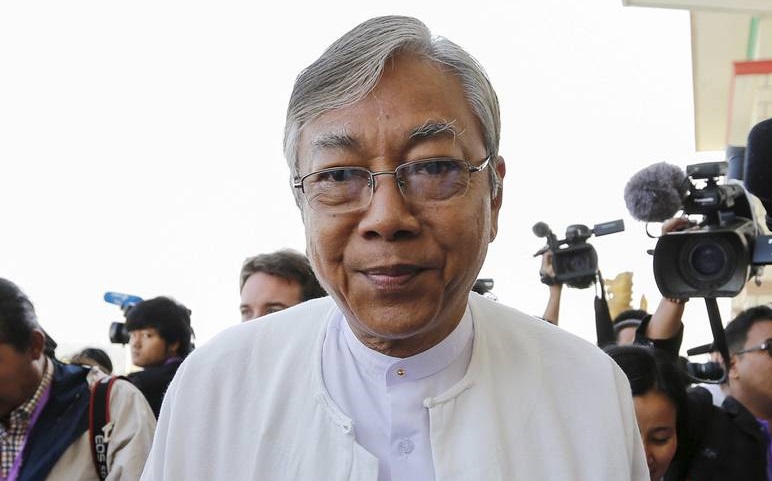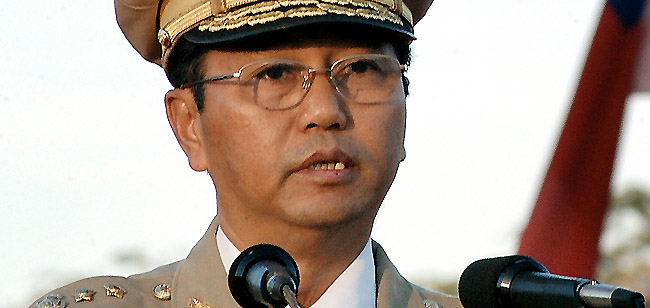
As Barack Obama once famously said, ‘Elections have consequences.’
Indeed, few elections were more consequential in 2015 than the landmark vote in Myanmar, the country’s first freely open democratic election after a decades-long fight by activist Aung San Suu Kyi, a daughter of one of the country’s founding fathers, who began fighting to open Burmese political space in the early 1990s. The most outward consequence of that victory was Tuesday’s election of a new president, and the majority commanded by Suu Kyi’s National League for Democracy (NLD) meant that it could essential name the president.
With one exception. The most obvious choice, Suu Kyi, by far the country’s most popular figure, is barred from running because of a constitutional technicality. Instead, electors chose the next best thing: a close ally and friend fighting alongside Suu Kyi for decades.
* * * * *
RELATED: Burmese opposition victory a policy triumph for Clinton too
* * * * *
Accordingly, Myanmar’s new president — and its first truly civilian president after a half-decade of military rule — is Htin Kyaw.
A 69-year-old British-educated computer sciences expert and author, Htin Kyaw was a civil servant in the 1980s before joining Suu Kyi’s democratic crusade. A longtime intimate of the Nobel peace laureate, he made it immediately clear upon his election that it would be Suu Kyi calling the shots in the new government. Suu Kyi herself has said that she will be ‘above the presidency,’ though she may yet take a role, such as foreign minister, in the new government.
It was a showcase moment for Burmese democracy, one of the most fruitful pro-democracy projects of former US secretary of state Hillary Clinton. Though November’s breakthrough vote and Tuesday’s presidential selection were, first and foremost, Suu Kyi’s victories, Clinton and the Obama administration took a keen interest in opening diplomatic and economic ties with Myanmar as its aging military leadership increasingly permitted greater political freedoms, a step that accelerated the acceptance of 2015’s elections.

The new government will face far tougher tests in dislodging the enduring power of the military, which holds 25% of the seats in both houses of the Burmese parliament, including 110 of the seats in the the lower house, the 440-member Pyithu Hluttaw (House of Representatives). As Htin Kyaw sailed to victory, however, the military and opposition elected Myint Swe, a former general with ties to the old guard, and who helped crush the so-called ‘Saffron Revolution’ in 2007, as first vice president.
Described as a ‘vulture among sparrows,’ American and European officials have blacklisted him in the past. He was elected despite the fact that his son was once an Australian citizen. Ironically, the military blocked Suu Kyi from the presidency for the foreign citizenship of her children.
It’s ominous that the opposition supported such a controversial military figure instead of one of several reformers from the prior administration. If Htin Kyaw is incapacitated for any reason, Myanmar’s president will be someone possibly even more reactionary than Than Shwe, who ruled the country from 1992 to 2011. At best, it’s a sign that the military isn’t ready to give up what amounts to a veto on the new government. At worst, it could be a sign that the military has no intentions of ceding power to Suu Kyi. The military still controls the important National Defence and Security Council, and Suu Kyi herself has taken a somewhat conciliatory approach to working with the military.
Meanwhile, as Myanmar transitions from a military, authoritarian regime into something far more democratic, it could unleash the political forces of a conservative Buddhist nationalism that have kept Suu Kyi and other activists from taking up the plight of ethnic and religious minorities, including the Muslim Rohingya community. Even if Suu Kyi and Burmese democrats are successful in establishing a stable democracy in Myanmar, they might be appalled to find themselves muscled out of power in the future by nationalists and religious conservative groups, such as the Ma Ba Tha movement.
There’s no doubt Suu Kyi has come a long way after spending nearly two decades under house arrest. The steepest climb, however, is only just beginning.